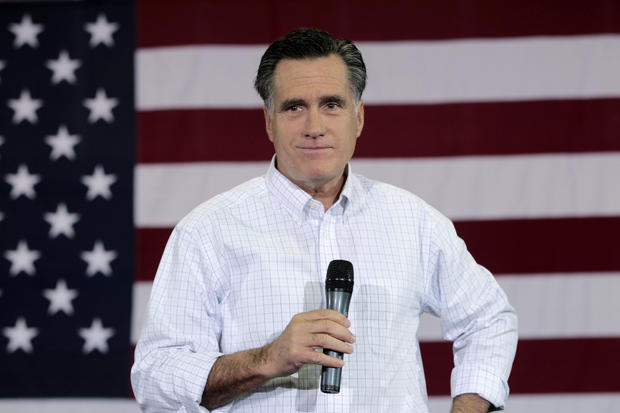Romney's wealth an insurmountable hurdle?
This post originally appeared on Slate.
Mitt Romney has said that he would like to talk about income inequality -- but only in "quiet rooms." Romney is learning, however, that there is no way to keep the inequality conversation between four walls. It's going to occur in quiet rooms, in loud rooms, on debate stages, and, most importantly, in the quiet room known as the voting booth.
Campaigning in South Carolina Tuesday, Romney learned just how difficult this issue will be when he tried to take advantage of the new fascination with income inequality to attack rival Newt Gingrich. Gingrich's capital gains tax of 0 percent would be a huge windfall to the wealthy, he argued, whereas his plan would offer a capital gains break only for the middle class. But then the Time's Mark Halperin asked Romney about his own personal tax rate. Romney said it was about 15 percent, because he doesn't make much wage income. Suddenly the income inequality issue that Romney had been trying to exploit was being turned against him. The White House spokesman and Democratic National Committee said that Romney was an example of just the kind of taxpayer the president thought should be paying more in times of tight budgets.
The primary question of the 2012 campaign appears to be: What is fair? Is the government, through design or stupidity, tilted against some and rewarding others? Is the private enterprise system broken because of corporate greed and stupidity, or is it instead hindered by government? And no matter how you answer those questions, both parties agree that you are getting screwed, and that fairness, which was at the heart of the American Dream, is disappearing.
Poll: Obama ties Romney in head-to-head match upRick Santorum offers Orwellian ad against Romney
Special section: Election 2012
Romney has an uncanny ability to create moments that highlight his wealth. He said part of his income came from "speakers' fees from time to time, but not very much."
"Not very much" to Romney turned out to be nearly $400,000. Romney also made a $10,000 bet with Rick Perry. He joked that he was unemployed. When he talks about his grandchildren he doesn't tell warm stories about throwing spaghetti, he describes how they caused him to change the distribution of his estate.
Romney tries to narrow the vast gap between his life and the daily struggle of regular people. It often doesn't work out well. His talk of worrying about pink slips offered an opportunity for Rick Perry to joke that it was Romney's fear of running out of them that really worried him.
The political question is whether voters think Romney's wealth makes him more able or less able to turn around the economy in a way that helps them. Political scientist John Sides has run the numbers and suggests a strong correlation between those who think Romney is wealthy and those who think he doesn't care about their lives.
We've had rich presidents before -- FDR and John F. Kennedy -- but their wealth was not seen as an impediment because voters believed those guys were looking out for them.
Romney's Republican opponents are in a pickle. They want to make fun of Romney (you can't even spell his name without M-O-N-E-Y!) but they don't want to look like they're playing "class warfare" or "punishing success." Still, they can't help themselves. Newt Gingrich, whose Tiffany credit line put him on the defensive, joked that he'll name his 15 percent flat tax, "the Mitt Romney flat tax."
Speaking on Fox and Friends Wednesday morning, Santorum gave Romney a pass on his tax rate but not the speaking fees. "To make a statement that I made a couple of extra bucks giving speeches when that couple of extra bucks was over $300,000 -- I mean, that to me says a little bit more about Governor Romney and his connection with the American people than his tax rate."
The defense of Republican candidates who would make something of Moneybags Mitt is that they are not criticizing his right to build houses across the land and pave the driveways in gold, they are merely saying that his wealth is an impediment to understanding the economy.
Santorum says Romney will never win over blue-collar voters in Pennsylvania and Ohio the way he'd be able to. "Maybe he'll get some liberals on Wall Street or Hollywood to vote for him but is he going to get the guys that Reagan got? The guys in Eastern Pennsylvania, or outside of Detroit, or in the factories in Wisconsin. The answer is no. Who is? Maybe the grandson of a coal miner who grew up in a steel town."
Santorum is in sync with the Democratic National Committee. In the general election they will use Romney's wealth to blunt his message on the economy. Romney says his business experience gives him unique insight into the way the economy works. Democrats will argue that he can't possibly understand how regular people live their lives. Romney says President Obama is out of touch with the economy and points to his record. The president's advisers will say Romney is out of touch and point to his tax rate.
When I asked several conservative voters in South Carolina about Romney's tax rate, most were unbothered. One man thought Romney should pay more given how rich he is. But the majority thought it was the correct amount. "But that's the right rate, isn't it?" asked Nancy Eaton, who had stopped by the Flight Deck restaurant to hear Rick Santorum before attending her twice-monthly bible study. Her friend Katherine Ellstrom then offered a textbook defense of how lower capital gains rates encourages investment, which creates jobs. Perhaps Romney should find Mrs. Ellstrom and send her out as his surrogate. Unfortunately for Romney, she's likely to vote for either Santorum or Gingrich.

